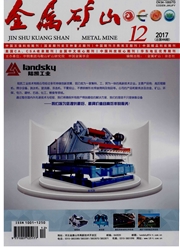

 中文摘要:
中文摘要:
针对岩爆烈度分级预测中存在诸多不确定因素的问题,应用贝叶斯判别分析法建立岩爆烈度分级预测的评价模型。根据岩爆的特点及成因,选取岩石的弹性能量指数Wet,应力系数σθ/σc及岩石脆性系数σc/σt作为判别因子;将岩爆烈度分为无、弱、中、强4个等级并作为贝叶斯判别分析的4个正态总体;以国内外14组工程岩爆分析初始数据进行分级判别,以训练样本建立贝叶斯线性判别函数,以该函数计算待判样品的贝叶斯判别函数值,以最大值对应的总体作为样品的归属。为进一步考察该模型的有效性与实用性,运用该模型对秦岭隧道工程及凡口铅锌矿的岩爆实例进行分析,并与人工神经网络模型、模糊概率模型的判别结果及实际情况进行比较。研究结果表明,该模型判别预测结果与人工神经网络模型及模糊概率模型的判别结果及实际岩爆情况较吻合。
 英文摘要:
英文摘要:
In view of many uncertain elements in classification and prediction of rockburst intensity,the evaluation model for classification and prediction of rockburst intensity is established by Bayes discriminant analysis.According to the characteristic and cause of rockburst,three factors of the stress coefficient of rock,the brittleness coefficient of rock and the elastic energy index of rock are selected as the discriminant factors.And the intensity of rockburst is divided into 4 grades,denoted as none,inferior,medium and intense,which are taken as the four normal populations in Bayes discriminant analysis.The classification discrimination is carried out based on the initial data for rockburst intensity analysis of 14 rock projects around the world.Bayes linear discriminant function is obtained through the training samples,which is then used to calculate the Bayes function value of the evaluating samples.Meanwhile,the population corresponding to the maximum function value is used to judge which population the evaluating sample belongs to.In order to verify the effectiveness and feasibility of the model,the cases of Qinling Tunnel and Fankou Lead-Zinc Mine are analyzed using the proposed method,and the obtained results are also compared with the results of neural network model,fuzzy probability model and practical conditions.The results show that the results predicted by Bayes model are both in good agreement with the practical conditions and the results obtained from the neural network model and fuzzy probability model.
 同期刊论文项目
同期刊论文项目
 同项目期刊论文
同项目期刊论文
 期刊信息
期刊信息
